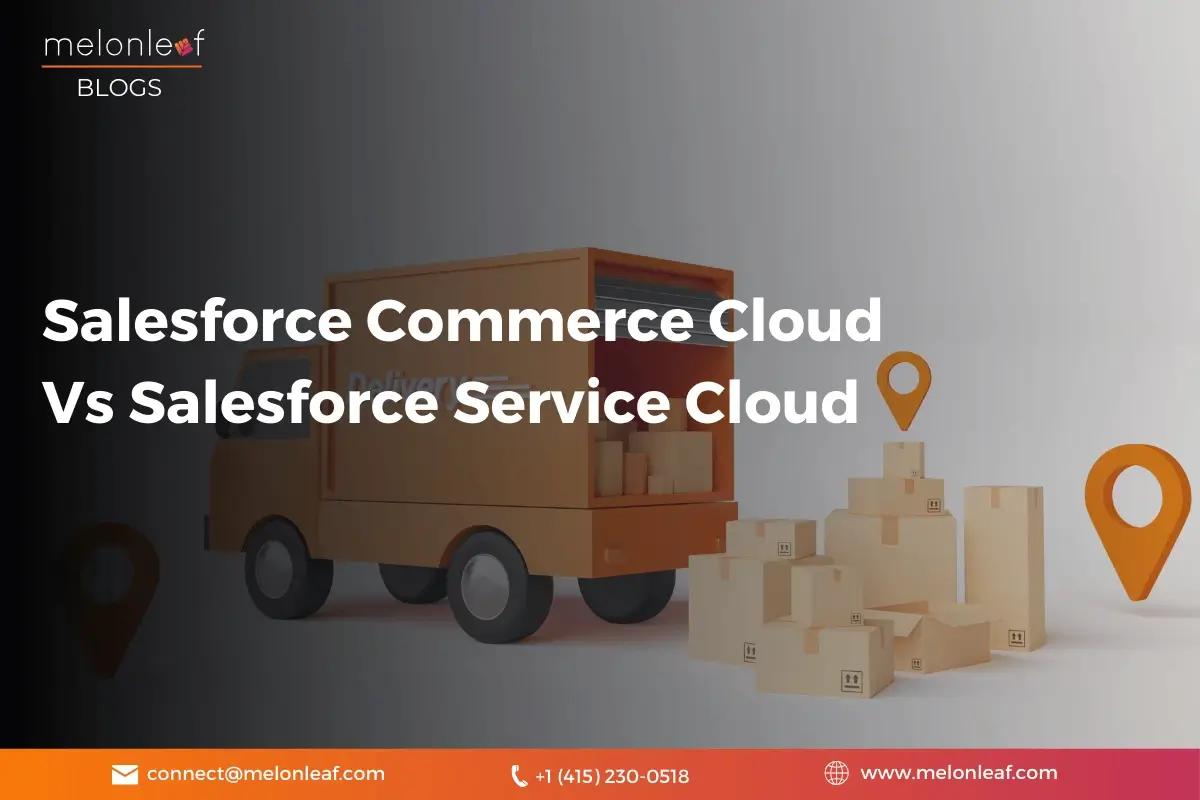Salesforce, a titan in the world of cloud-based solutions, offers two powerful products that cater to different business needs, Salesforce Commerce Cloud and Salesforce Service Cloud. While both belong to the same family, they serve entirely different purposes. Commerce Cloud is the trusted choice for businesses looking to build and grow online stores, while Service Cloud stands as a stronghold for companies prioritizing customer support and service operations.
But how do these two differ? More importantly, which one is the right fit for your business? This blog takes a deep dive into their core functionalities, benefits, and distinctions, let’s dive in!
Overview of Salesforce Commerce Cloud
What is Salesforce Commerce Cloud?
Salesforce Commerce Cloud is a cloud-based eCommerce solution designed to help businesses create engaging, personalized, and scalable digital shopping experiences. From product discovery to checkout, it offers a fully integrated platform that adapts to both B2C and B2B markets.
Key Benefits of Salesforce Commerce Cloud
Scalability for Growth: Businesses can start small and expand without worrying about infrastructure constraints.
Unified Customer Experience: Connects with marketing, sales, and service to offer a cohesive journey.
AI-Powered Personalization: Einstein AI delivers product recommendations and tailored shopping experiences.
Omnichannel Integration: Provides a consistent shopping experience across mobile, social, and web.
Cloud-Based Flexibility: No need for single-way management, allowing for rapid innovation.
Features of Salesforce Commerce Cloud
- Headless Commerce: Provides flexibility to create custom storefronts using APIs.
- Order Management System (OMS): Simplifies order tracking, inventory management, and fulfillment.
- Mobile-First Capabilities: Optimized for mobile shoppers with PWA support.
- AI-Driven Merchandising: Uses predictive analytics for personalized product placements.
- Commerce Insights: Advanced reporting and analytics for better decision-making.
Who uses Salesforce Commerce Cloud?
Commerce Cloud is widely used by retailers, D2C brands, and large enterprises aiming for a frictionless online shopping experience. It caters to brands like Adidas, Puma, and L’Oréal, helping them scale their e-commerce operations with ease.
Read More: A Comprehensive Guide to Salesforce Commerce Cloud
Overview of Salesforce Service Cloud
What is Salesforce Service Cloud?
Service Cloud is Salesforce’s dedicated customer service and support platform. It is aimed to improve customer interactions, automate workflows, and empower support agents, it’s a powerhouse for businesses that prioritize customer satisfaction.
Key Benefits of Salesforce Service Cloud
- Improved Customer Satisfaction: Faster response times and automated case management reduce friction.
- AI-Powered Assistance: Einstein AI improves self-service options and agent productivity.
- Multichannel Support: Customers can reach out via phone, email, chat, or social media.
- Field Service Management: Helps businesses manage on-the-go service operations.
- Integrated Knowledge Base: Provides a self-service portal to deflect common queries.
Features of Salesforce Service Cloud
- Case Management: Tracks and resolves customer queries efficiently.
- Omni-Channel Routing: Assigns cases to the right agents based on workload and expertise.
- Automation with Macros: Automates repetitive tasks to improve efficiency.
- Service Console: A dashboard providing a 360-degree view of customer interactions.
- Self-Service Portals: Makes customers to find answers on their own.
Who uses Salesforce Service Cloud?
From startups to multinational corporations, Service Cloud is used by businesses across industries to enhance customer service. Companies like Spotify, Toyota, and Amazon use Service Cloud to manage customer interactions.
Read More: Complete Guide to Salesforce Service Cloud
Salesforce Commerce Cloud vs. Salesforce Service Cloud: What’s the Difference?
While both solutions fall under the Salesforce umbrella, their purpose, functionality, and target users differ significantly. Below is a detailed comparison of their core differences:
1. Purpose and Core Functionality
Salesforce Commerce Cloud
Primarily designed for businesses that sell products online, Commerce Cloud does e-commerce transactions, product catalog management, personalized shopping experiences, and order fulfillment. It helps brands create engaging digital storefronts while optimizing the entire buying journey.
Salesforce Service Cloud
Focused on customer support and service management, Service Cloud enhances interactions between businesses and their customers. It provides AI-powered case resolution, self-service portals, omnichannel support, and automation to improve customer satisfaction and agent efficiency.
2. Target Users and Industries
Salesforce Commerce Cloud
Used by retailers, direct-to-consumer (D2C) brands, wholesalers, and businesses in industries like fashion, electronics, healthcare, and automotive to create digital shopping experiences.
Salesforce Service Cloud
Ideal for companies in customer-centric industries such as healthcare, finance, telecommunications, and SaaS (Software as a Service), where providing quick and effective customer support is crucial.
3. Customer Interaction and Engagement
Salesforce Commerce Cloud
Interaction occurs through digital storefronts, personalized promotions, AI-driven recommendations, and omnichannel shopping experiences (web, mobile, social, and in-store). It focuses on attracting, converting, and retaining customers through marketing and sales-driven strategies.
Salesforce Service Cloud
Engagement is centered around customer service touchpoints, such as chatbots, phone support, knowledge bases, and case management systems. It aims to resolve issues, strengthen customer relationships, and build loyalty through efficient support mechanisms.
4. Features and Tools
Salesforce Commerce Cloud
Includes AI-powered merchandising, product catalog management, order fulfillment, mobile-first shopping experiences, and integrations with third-party payment gateways.
Salesforce Service Cloud
Offers case management, AI-driven chatbot assistance, automation for ticket resolution, customer self-service portals, and analytics for tracking service performance
5. AI and Automation
Salesforce Commerce Cloud
Uses Einstein AI to personalize customer experiences by analyzing purchasing behavior, suggesting products, and optimizing pricing and promotions.
Salesforce Service Cloud
Also powered by Einstein AI, but its focus is on automating customer support processes, predicting case resolutions, routing customer queries to the right agents, and offering chatbot-powered self-service options.
6. Integration Capabilities
Salesforce Commerce Cloud
Integrates with marketing tools, payment gateways, inventory management systems, and third-party logistics providers to create an end-to-end e-commerce ecosystem.
Salesforce Service Cloud
Connects with CRM, helpdesk software, communication platforms (such as Slack and WhatsApp), and external databases to enhance customer support and relationship management.
7. Customer Retention vs. Acquisition
Salesforce Commerce Cloud
Focuses heavily on customer acquisition through digital marketing, personalized product recommendations, and optimized checkout experiences. The goal is to drive conversions and repeat purchases.
Salesforce Service Cloud
Prioritizes customer retention by providing efficient, proactive support that increases brand trust and long-term loyalty. It helps reduce churn by resolving issues quickly and effectively.
8. Use in B2B vs. B2C Models
Salesforce Commerce Cloud
Suited for both B2C and B2B businesses, but particularly strong in B2C e-commerce, where customer experience and purchase journeys are highly personalized. Salesforce B2B Commerce Cloud is available for businesses handling bulk orders, contract-based pricing, and corporate procurement.
Salesforce Service Cloud
Used extensively in both B2C and B2B industries where customer interactions, case resolutions, and long-term service relationships are critical.
9. Impact on Revenue Generation
Salesforce Commerce Cloud
Directly contributes to revenue growth by facilitating online transactions, increasing conversions, and optimizing sales strategies.
Salesforce Service Cloud
Indirectly influences revenue by enhancing customer satisfaction, reducing churn, and building stronger customer relationships that lead to repeat business and referrals.
Which Salesforce Cloud is right for your Business?
The right choice depends on what drives your business. Are you focused on selling smarter and creating immersive shopping experiences, or do you prioritize exceptional customer service and long-term relationships? Here’s how to decide:
Choose Salesforce Commerce Cloud if:
- Your business thrives on online sales and eCommerce growth.
- You need AI-powered product recommendations and smart merchandising.
- Omnichannel shopping across web, mobile, social, and stores—is a top priority.
- Advanced order and inventory management is crucial for operations.
Choose Salesforce Service Cloud if:
- Customer service and support are the backbone of your business.
- Intelligent case management and automated workflows would improve efficiency.
- You want to implement AI-powered chatbots and self-service portals to enhance support.
- Your team needs a unified platform to manage customer interactions across channels.
Which Salesforce Cloud is right for your Business?
The right choice depends on what drives your business. Are you focused on selling smarter and creating immersive shopping experiences, or do you prioritize exceptional customer service and long-term relationships? Here’s how to decide:
Choose Salesforce Commerce Cloud if:
- Your business thrives on online sales and eCommerce growth.
- You need AI-powered product recommendations and smart merchandising.
- Omnichannel shopping across web, mobile, social, and stores—is a top priority.
- Advanced order and inventory management is crucial for operations.
Choose Salesforce Service Cloud if:
- Customer service and support are the backbone of your business.
- Intelligent case management and automated workflows would improve efficiency.
- You want to implement AI-powered chatbots and self-service portals to enhance support.
- Your team needs a unified platform to manage customer interactions across channels.
Can you use both?
Yes! Many businesses integrate Commerce Cloud and Service Cloud to create an end-to-end solution. While Commerce Cloud handles sales and transactions, Service Cloud makes sure of post-purchase customer satisfaction.
Wrapping Up
Salesforce Commerce Cloud and Salesforce Service Cloud may share the same DNA, but they couldn’t be more different in personality. They are like two siblings, one is the ultimate shopkeeper, always curating the best products and crafting seamless shopping experiences. The other is the problem-solver, ready to assist, guide, and turn frustrated customers into lifelong brand loyalists.
Choosing between them isn’t just about picking a tool, it’s about defining how your business interacts with customers. Do you want to sell smarter, personalize shopping journeys, and boost revenue? Commerce Cloud is your go-to. Do you need to build lasting relationships, resolve issues quickly, and deliver exceptional service? Service Cloud is your answer. And if you need both to work in harmony? That’s where the real magic happens.
At Melonleaf Consulting, we help businesses make strategic Salesforce decisions that offer growth and efficiency. Whether you’re launching an eCommerce empire, perfecting customer service, or looking to integrate the best of both worlds, we’ll be your Salesforce Partner and help you build a Salesforce system that truly works for you.












